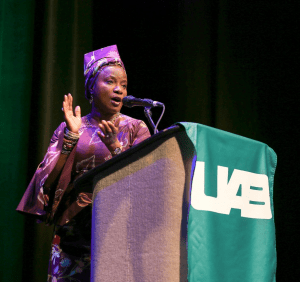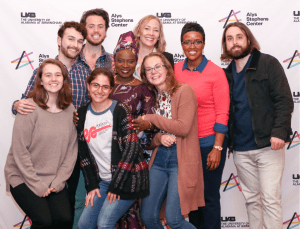On Thursday, March 22, Grammy Award-winning Beninise performer and human rights activist, Angélique Kidjo, offered a lecture at UAB’s Alys Stephens Performing Arts Center titled, Give Her Wings – Teach Girls and Empower Women. After bestowing the audience with an opening melody, Kidjo spoke of her diverse musical influences, such as R&B, funk and jazz, then shared stories about her childhood, personal growth and activism for girls — periodically breaking out in song whilst incorporating the crowd.

Born into a music family, Kidjo was not shy about her childhood, confessing she had “cool parents” shared with nine other siblings. Claiming to have never lived with fear, she was pressured into her first stage performance at the age of six, gracefully under spotlight, displaying her young talent which led to a standing ovation. However, during her adolescence, her singing become an issue for some boys in her community in which she became the victim of sexist ridicule and physical confrontation. Being discouraged by this incident, she told her mother she no longer wanted to sing, but was uplifted when told, “If you let people define who you are, you will never have a life”. Her father also claimed that once you engage in a physical fight, you have lost the battle – the most powerful tool is your brain. This encouraged Kidjo to coin the term Batonga which confidently means, “Get the heck out of my life. I’ll be whoever I want to be”.
In secondary school, Kidjo started noticing children not attending class, which confused her, then realized keeping girls in secondary school limits helping mothers in the home. This gave her conviction that without secondary education, girls are limited to being mothers and wives, influencing her activism for children’s education and girl’s empowerment. Kidjo’s Batonga Foundation addresses the gender disparity in secondary and higher education throughout Africa, offering scholarships, books, tutoring, mentoring and meals.
Kidjo believes educating girls will engender world peace and influence them to not raise macho men who hijack women in the name of fear. She asked the crowd, “How do you view your kids, if your wife is viewed as inferior? Man up!”. She then briefly touched on her experiences as an African woman living in 1980s Paris, being shocked by blatant racism but standing her ground, and declared the brain and soul have no color, the world is yours and don’t be afraid to challenge people – a mindset inherited from the empowered women who raised and supported her.
Kidjo ended her lecture with one final number that included the crowd. With her grace and leadership, the crowd joined her and steadily chanted, “Chez mama, chez mama Africa”, a precursor to the following night’s concert.

Soon after, young girls and boys rushed to the microphone and asked Kidjo how they could be leaders just like her. She expressed to many of these young, impressionable minds how the liberating power of music gives one the confidence and strength in the face of adversity – Batonga.
